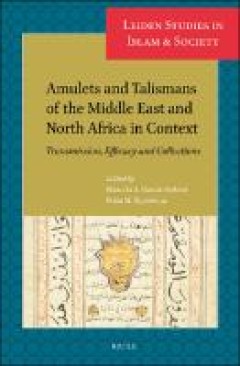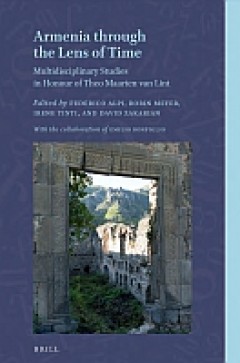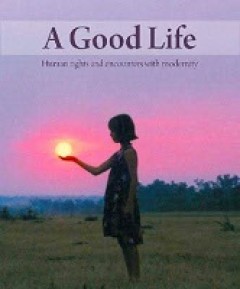Ditapis dengan

E-Book Amulets and Talismans of the Middle East and North Africa in Context: …
In this volume amulets and talismans are studied within a broader system of meaning that shapes how they were manufactured, activated and used in different networks. Text, material features and the environments in which these artifacts circulated, are studied alongside each other, resulting in an innovative approach to understand the many different functions these objects could fulfil in pre-mo…
- Edisi
- -
- ISBN/ISSN
- 9789004471481
- Deskripsi Fisik
- 319 halaman
- Judul Seri
- -
- No. Panggil
- 939.4 GAR a

E-Book A Poetic History of the Oceans: Literature and Maritime Modernity
What is the ocean’s role in human and planetary history? How have writers, sailors, painters, scientists, historians, and philosophers from across time and space poetically envisioned the oceans and depicted human entanglements with the sea? In order to answer these questions, Søren Frank covers an impressive range of material in A Poetic History of the Oceans: Greek, Roman and Biblical text…
- Edisi
- -
- ISBN/ISSN
- 9789004426702
- Deskripsi Fisik
- 466 halaman
- Judul Seri
- -
- No. Panggil
- 930 FRA a
E-book A Short History of Bali : Indonesia's Hindu Realm
In the early 1980s I was sitting in the coffee shop of the Bali Beach Hotel in Sanur, reflecting on the strange fact that Dutch troops had come ashore nearby, less than 80 years previously, on their way to perpetrate one of the more extraordinary massacres in the history of colonialism. I did not know that the Japanese had also landed in this same area in 1942, or that the Dutch had returned he…
- Edisi
- -
- ISBN/ISSN
- 1865088633
- Deskripsi Fisik
- 285 hlm
- Judul Seri
- -
- No. Panggil
- 959.8 PRI a
E-book Beginner's Danish
Historically speaking, Danish is a dialect of a common Scandinavian language known from around 200 AD. Around 1100-1200 AD, Danish became a distinctive language with a distinctive pronuncation. The period from 800-1100 AD is called Old Danish or Runic Danish, as our knowledge of the language is primarily based on runic inscriptions. In the 20th century, the advent of radio broadcasts in 1932 an…
- Edisi
- -
- ISBN/ISSN
- -
- Deskripsi Fisik
- 355 hlm
- Judul Seri
- -
- No. Panggil
- 948.1 SCH b

E-Book Armenia through the Lens of Time
The open access publication of this book has been published with the support of the Swiss National Science Foundation. From pilgrimage sites in the far west of Europe to the Persian court; from mystic visions to a gruesome contemporary “dance”; from a mundane poem on wine to staggering religious art: thus far in space and time extends the world of the Armenians. A glimpse of the vast and st…
- Edisi
- -
- ISBN/ISSN
- 9789004527607
- Deskripsi Fisik
- 566 halaman
- Judul Seri
- -
- No. Panggil
- 939.5 ALP a
E-book Outline of U.S. History
The first people to reach North America almost certainly did so without knowing they had crossed into a new continent. They would have been following game, as their ancestors had for thousands of years, along the Siberian coast and then across the land bridge. Once in Alaska, it would take these first North Americans thousands of years more to work their way through the openings in great glaci…
- Edisi
- -
- ISBN/ISSN
- -
- Deskripsi Fisik
- 380 hlm
- Judul Seri
- -
- No. Panggil
- 970 TIM o

E-Book Astrophysics, Astronomy and Space Sciences in the History of the Max P…
This book provides the first comprehensive historical account of the evolution of scientific traditions in astronomy, astrophysics, and the space sciences within the Max Planck Society. Structured with in-depth archival research, interviews with protagonists, unpublished photographs, and an extensive bibliography, it follows a unique history: from the post-war relaunch of physical sciences in W…
- Edisi
- -
- ISBN/ISSN
- 9789004529137
- Deskripsi Fisik
- 745 halaman
- Judul Seri
- -
- No. Panggil
- 523.01 BON a
E-book Moving Histories : Irish Women’s Emigration to Britain from Independ…
This book looks at the impact women’s migration had on Ireland in the crucial years of initial independence, from the partition of the island and the founding of the Free state to the declaration of a Republic. This period saw Ireland move from internal political instability in the 1920s to a more internationally focused country in the 1950s. However, emi…
- Edisi
- -
- ISBN/ISSN
- 9781786949608
- Deskripsi Fisik
- 296 hlm
- Judul Seri
- -
- No. Panggil
- 941 RED m
E-book A Memory of Ice : The Antarctic Voyage of the Glomar Challenger
Growing up in Western Australia, in the southwestern corner of that huge and sparsely populated state, it was difficult to be unaware of the bizarre splendour, diversity and colour of the local vegetation. This, the South West Botanical Province, is now recognised as one of 25 biodiversity hotspots in the world. Its abundance of flowering plants, possibly over 9,000 species, is greater than alm…
- Edisi
- -
- ISBN/ISSN
- 9781760462956
- Deskripsi Fisik
- 246 hlm
- Judul Seri
- -
- No. Panggil
- 998 TRU a

E-Book A Good Life: Human Rights and Encounters with Modernity
This book is a story. It’s a story about ordinary people in very different parts of the world dealing with rapid change in the late twentieth and early twenty-first
- Edisi
- -
- ISBN/ISSN
- 9781922144669
- Deskripsi Fisik
- 314 halaman
- Judul Seri
- -
- No. Panggil
- 909.82 EDM a
 Karya Umum
Karya Umum  Filsafat
Filsafat  Agama
Agama  Ilmu-ilmu Sosial
Ilmu-ilmu Sosial  Bahasa
Bahasa  Ilmu-ilmu Murni
Ilmu-ilmu Murni  Ilmu-ilmu Terapan
Ilmu-ilmu Terapan  Kesenian, Hiburan, dan Olahraga
Kesenian, Hiburan, dan Olahraga  Kesusastraan
Kesusastraan  Geografi dan Sejarah
Geografi dan Sejarah